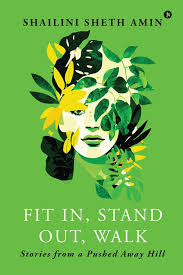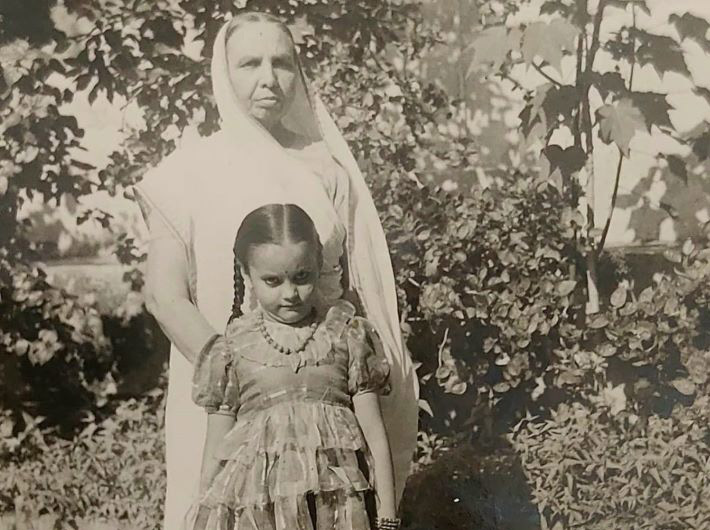Fit In, Stand Out, Walk: Stories from a Pushed Away Hill
By Shailini Sheth Amin
Notion Press, Rs 399
 Here is a collection of heartfelt stories told through the life's ups and downs. From nothing to inherit and no one to inherit from, these stories share the grit and conviction of women to build their own legacy and pass on more than the material wealth.
Here is a collection of heartfelt stories told through the life's ups and downs. From nothing to inherit and no one to inherit from, these stories share the grit and conviction of women to build their own legacy and pass on more than the material wealth.
In this anthology, Neelima’s tale inspires all, even those facing their toughest moments, leaving a lasting impact on the power of relationships, love, and grief. With a unique and fresh perspective and a personal voice, ‘Fit In, Stand Out, Walk’ is perhaps a meaningful contribution to women’s storytelling literature which delves into topics such as identity, isolation, and survival, crafting a rich narrative that spans across generations and geographical boundaries.
This memoir is about Neelima who has lived on a slightly pushed away hill; her life as an orphan child of Mumbai going to become a sustainability warrior. Her unusual childhood with profound losses along with inspiring women with their fascinating lives who nurtured her.
The story is of vision and passion of a working woman and her struggles to remain her own person as a daughter, a wife, a divorcee, a mother, a widow and her deep and loving connected-ness with nature and lifelong mentors. Her life spreads across Mumbai, Ahmedabad, and Pondicherry in India and to London as an NRI and her work as an architect, founder of sustainable fashion brand, a spokesperson, community worker and an avid traveller.
The book deals with social and personal realities of abandonment, adoption, bisexuality, narcissism, depression, domestic abuse and it breaks the cliché, ‘there is a supporting husband behind a successful wife!’ When wokeism and victimhood cultures growing in some communities this story is about her challenges to explore and discover the moral fiber within her; a story of self-determination, survival and living for a larger vision. This inspiring tale is narrated with joy, humour, pain, loss and courage and their many shades told with intimacy and honesty.
Shailini Sheth Amin is an architect, a community project initiator and a financial consultant. She studied in India and in the UK. Her field of work has been in energy efficiency and sustainable practices, conservation programs and heritage support to buildings, people and places. A spokesperson for sustainability, crafts and Fair Trade, she writes regularly for periodicals and in the social media.
Here is an excerpt from this memoir, about a well-known family in Ahmedabad and their home in the 1960s:
Borsali
We were living in a big house with a cook, servants, and maids. A car with a driver would drop me off and pick me up from school. On our way, we would pick up my friend Seema and her cousins Haripriya, Vinu, and Chaitan, who lived next door. Sometimes Seema’s brother Kiranbhai would join us if he was late cycling to school. There would be eight of us, all piled in with the driver. It was fun! Like many people at that time, our daily life was very simple. It was normal to have a school uniform, four or five frocks, and probably a couple of fancier dresses for occasions. I had the same; the only difference was that my clothes were made of khadi cloth. The daily food was simple rotli, vegetables, rice, and dal for lunch, and a vegetable dish in the evening. Behenji was very fussy about food; she would go on and off certain foods quickly and would end up eating only one or two things. A feast would be prepared on festivals or when we had guests at home for a meal.
Diwali was a big festival. A month before that, we would all join in to polish brass vases and pots, and also the brass door hinges and handles, to make them glisten and shine. Rooms are cleaned and re-cleaned.
Some new clothes were made for me. Large-scale food shopping of flour, sugar, ghee, and spices was done through special shops and traders. All kinds of savory and sweets would be made at home, involving days of preparation. On the festival day, the house was decorated with Asopalav torans, rangoli, and flowers. Platefuls of goodies would be sent out to other families, and even more goodies would be received from them.
Behenji, because of her unadulterated love and care for her extended family, would invite and welcome her uncles and aunts, her cousin brothers and sisters, and their families at home. They, too, would look forward to meeting their beloved cousin’s sister. They looked up to her.
Married into different families, living in different places, they had varied personalities, understandings of their situations, approaches, and lifestyles of their own. I did not have my own mother, father, brothers, and sisters. Getting to know them and hearing about them was my learning of what families and family lives can be like. Getting to know about their pleasures, displeasures, social, financial, and other conditions; harmony and disharmony between family members and children; deep-rooted anger, frustrations, and jealousy; as well as understanding, compassion, love, and joy I have wonderful memories of them.
They were Motiben’s cousins, so I too was given love and affection by them. My mashi Geetaben and my masa Kapilbhai were really good to me. They were a happy couple. They were affluent and lived in a spacious flat on Peddar Road in Mumbai. Geetamashi was a dynamic and lively person. She used to sing, play sitar, paint, and had several hobbies; she loved all good things—clothes, jewelry, home decor—she and her home were in a class of their own! They would invite me to shows and picnics. Geetamashi, smiling and happy, was my window to the picture of a good life and marriage. Her daughters and my cousins Prema and Pratima, both younger than me, are like my sisters.
My mashi Kamalaben took a real interest in me. Kind and caring, she would ask me about the smallest details of what was going on in my life, and opening up to her provided me with a much-needed outlet. She made sure I was doing well. Her generous sharing of her wisdom and love was very valuable, and she meant a lot to me. Her son Ajaybhai and daughter Devika have been my close family for life. My mashi Hasuben used to come from Mumbai to us during the summer vacation. Her children, Samiksha and Manojbhai, were a little older than me. We were a team. We spent many summer afternoons together playing, laughing, teasing, being outrageous and naughty, and having wholesome fun.
We are still very close. There were many more uncles, aunts, and cousins who were close to me in those days. With time and changing circumstances and outlooks, I became less and less of a family for some of them. I was ‘photo-shopped’ and erased out of their lives.
Motiben’s dear friend Kaminiben has been there for me for all these years. She has loved me like a mother all through my life. She and her husband Mukeshbhai were my ‘guardians’ in many different ways. She would come to see me, take me out. Now in her nineties, I meet her regularly. Even now, she calls me if I haven’t called for some time. She once told me that she had promised Surabhi (Motiben) that she would take care of me, and how diligently she had done so!
In those days, my ‘Bapuji’ Bhudhar Dada had moved back to Ahmedabad from Karachi. The family had lost everything in speculative investments. Behenji made her mama stay with her and took care of him in his old age. He was old and weak, but a voracious reader, and would read newspapers from beginning to end every day. Behenji and he would discuss world news: the war between China and India, murder of John F. Kennedy, new India and its policies, five-year plans, foreign relations, Jawaharlal Nehru, and the family histories of Indian leaders that Behenji knew and worked closely with. There were discussions about the Jain religion, its deep and advanced knowledge base and practices.
From their discussions I learnt a lot about Gandhiji, as a person and as a leader of the freedom movement.
Behenji would have social workers, school teachers from C.N. Vidyavihar and other institutions, people from the neighborhood, women in need, political candidates, and workers of Congress party (of that era) coming to meet her all the time. So many times, sitting in a corner of her room, I have heard their stories of progress, conflicts, injustice, difficulties, poverty, loss, courage, and determination.
These conversations were like lessons for me about creating a vision, planning, and strategy, running institutes, managing them while facing difficulties, and understanding limitation.
[The excerpt reproduced with the permission of the publishers]
